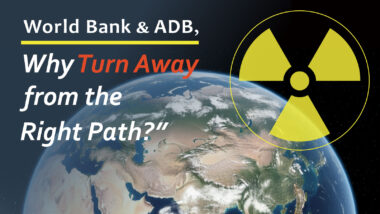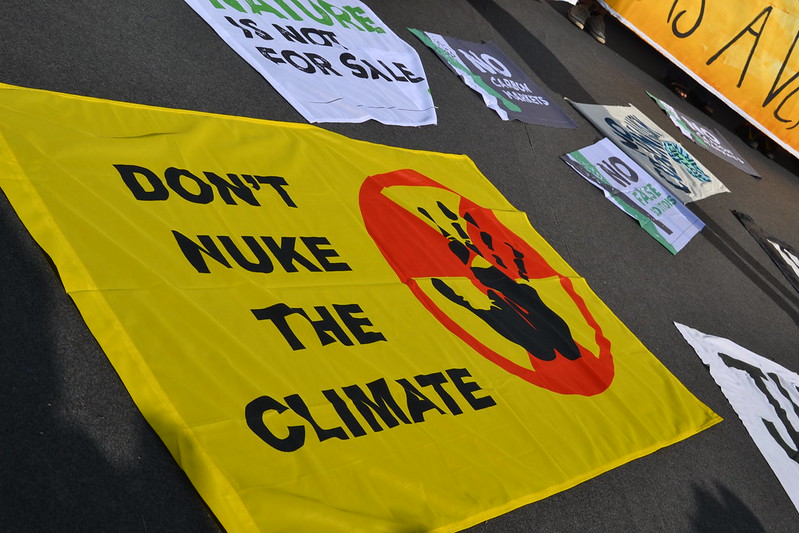Objection and Rebuttal Submitted to ADB’s Policy Shift Toward Nuclear Power
Friends of the Earth Japan, together with other civil society organizations, submitted letters of inquiry to the Asian Development Bank (ADB) on August 6 and 22 regarding the ongoing review of ADB’s Energy Policy, which includes a proposed shift toward supporting nuclear power.
Subsequently, ADB provided its responses. However, many of them did not sufficiently address our concerns. Therefore, we have compiled our comments and rebuttals to ADB’s responses and submitted them to ADB’s Board members.
ADB had planned to bring the proposed Energy Policy revision to its Board in early October, but this discussion has reportedly been postponed—likely reflecting the significant opposition expressed by many stakeholders.
October 6, 2025
Comments and Rebuttal on ADB’s Responses to Our Questions on the Proposed Revision of the Energy Policy
Dear ADB Board Members,
We received ADB Management’s responses to the questions we submitted on 6 and 22 August.
However, many of these responses do not adequately address our concerns. In particular, the explanations regarding the process are full of inconsistencies. This is an issue that directly affects ADB’s governance and could set a dangerous precedent. This document presents our main comments and rebuttals to ADB Management’s responses.
1. Removing the statement “ADB will not finance nuclear power” cannot be considered an amendment
Our question:
The proposed revisions concerning nuclear power represent a fundamental change from the current policy, and should not be considered a minor modification under the term “Amendment.” Is it not inappropriate to proceed under the current process?
ADB’s response:
Both the ADB 2009 and ADB 2021 Energy Policies recognize the role of nuclear energy in the low-carbon transition given its ability to provide low-carbon baseload electricity. In 2021, ADB allowed support for capacity building. The statement of recognizing nuclear power and providing capacity building but not allowing financing is not consistent with the objectives and principles of the policy. Based on the above, ADB views it as an amendment and not a complete or fundamental change in policy.
Our Rebuttal:
The current Energy Policy explicitly states that ADB will not finance nuclear power citing numerous barriers including the risks related to nuclear proliferation, waste management, and safety, as well as the very high investment costs relative to ADB’s resources. There is no inconsistency in this position.
Eliminating the phrase “will not finance nuclear power” constitutes a major policy shift and can by no means be regarded as a mere amendment.
2. On the risks of nuclear proliferation
Our question:
How does the ADB view the risks related to nuclear non-proliferation, possible military use, terrorism, and the potential of nuclear facilities becoming military targets?
ADB’s response:
ADB’s list of prohibited investment activities already excludes financing for the “production of or trade in weapons and munitions, including paramilitary materials.” Accordingly, the borrower/client will need to undertake due diligence and comply with this prohibition.
Our Rebuttal:
Including “production or trade in weapons and munitions (including paramilitary materials)” in the prohibited investment list is entirely unrelated to the risks that nuclear power poses in terms of proliferation, terrorism, and its potential to become a military target.
While ADB expresses expectations toward Small Modular Reactors (SMRs), it must be emphasized that SMRs actually heighten the risks of nuclear proliferation and terrorism compared to conventional reactors.
3. On nuclear waste
Our question:
With regard to nuclear waste disposal, most countries have not yet determined a final repository site, and such decisions are expected to involve considerable difficulties and social impacts in the future. How does the ADB take this into account?
ADB’s response:
Under the proposed revised language on nuclear power in the Energy Policy, should a request arise from a DMC, the ADB, in collaboration with the International Atomic Energy Agency (IAEA), may consider providing the necessary technical support so that nuclear waste disposal follows the applicable international standards and in line with the requirements set under ADB’s policies including environmental and social requirements. Disposal of waste is very much a part of any project sustainability and maintenance design. The ADB’s safeguard policy (SPS and ESF) requires assessment and management of environmental and social concerns of projects at all phases of the project cycle, from project development to implementation to completion, and will consider management of hazardous waste among other risks.
Our Rebuttal:
ADB should recognize that even advanced economies have not yet found solutions to nuclear waste disposal.
For example, in Japan, even the very first stage of selecting potential final repository sites—documentary surveys—has caused serious social divisions and conflicts within communities. The reprocessing plant has faced 27 separate delays in completion.
Nuclear waste is often forced upon politically and economically vulnerable regions, which is a fundamental ethical and social problem.
Believing that such complex issues could be resolved simply through technical assistance from ADB or the IAEA is unrealistic.
4. On the premises of ADB’s position
Our question:
The ADB has consistently cited “risks related to nuclear proliferation, nuclear waste, and safety issues” as well as “very high investment costs relative to ADB’s resources” as the reasons for its policy of not financing nuclear power. These circumstances remain unchanged today. Why then is the policy being revised?
ADB’s response:
ADB’s 2021 Energy Policy recognizes the role of nuclear energy in the low-carbon transition given its ability to provide low-carbon baseload electricity while recognizing the risks of nuclear power. The proposed wording on nuclear power continues to recognize the risks of nuclear power. ADB’s position on nuclear power has changed since October 2021 due to several reasons, including (i) declaration on tripling of global nuclear energy capacity by 2050 at COP28; (ii) increasing number of developing member countries in Asia expressing their interest to build nuclear power plants; (iii)advancements in the next generation of large nuclear reactors and small modular reactors; (iv) increasing demand for reliable and clean baseload electricity including for electric vehicles, data centers and air-conditioning; (v) tighter international safety standards and regulations following the Fukushima Daiichi accident.
Our Rebuttal:
The factors listed in (i)–(v) do not in any way resolve the “risks related to nuclear proliferation, nuclear waste, and safety issues,” nor the “very high investment costs relative to ADB’s resources.”
Below we offer specific rebuttals:
(i) Declaration on tripling of global nuclear energy capacity by 2050 at COP28:
This declaration was not an official COP28 decision but a voluntary statement by 23 countries. The fact that many countries did not join clearly shows it falls far short of a global consensus.
(ii) Increasing number of developing member countries in Asia expressing their interest to build nuclear power plants:
While it is true that some countries have expressed interest, this does not resolve the serious problems of nuclear proliferation and waste management. Furthermore, large-scale, centralized, high-cost, and high-risk nuclear power is not necessarily suited to these countries.
(iii) Advancements in the next generation of large nuclear reactors and small modular reactors (SMRs):
Next-generation large reactors fundamentally retain the same problems as existing ones. SMRs, moreover, are even more susceptible to military use and terrorist targeting, and their generation cost per unit of capacity is substantially higher than that of current reactors.
(iv) Increasing demand for reliable and clean baseload electricity:
Nuclear power, which is large-scale, centralized, prone to accidents, and produces unsolvable nuclear waste, can hardly be described as “clean” or “reliable.”
(v) Tighter international safety standards and regulations following the Fukushima Daiichi accident:
It is doubtful whether international safety standards and regulations have truly been strengthened since Fukushima. In Japan, for instance, the current regulatory standards are still inadequate, and the national regulator itself has repeatedly stated that these are not safety standards.
The above points represent only our main objections, yet even these make clear that ADB’s shift toward supporting nuclear power is deeply problematic.
We understand that the Board will soon meet to deliberate the proposed Energy Policy review.
We sincerely urge you to vote against the proposed changes.
Respectfully,
Ayumi Fukakusa, Executive Director, Friends of the Earth Japan
Yuki Tanabe, Program Director, Japan Center for a Sustainable Environment and Society (JACSES)
Hajime Matsukubo, Secretary General, Citizens’ Nuclear Information Center
Shoko Murakami, Chief Secretary, Citizens’ Commission on Nuclear Energy (CCNE)
Aileen Mioko Smith, Executive Director, Green Action
cc: Mr. Katsunobu Kato, Minister of Finance, Japan

